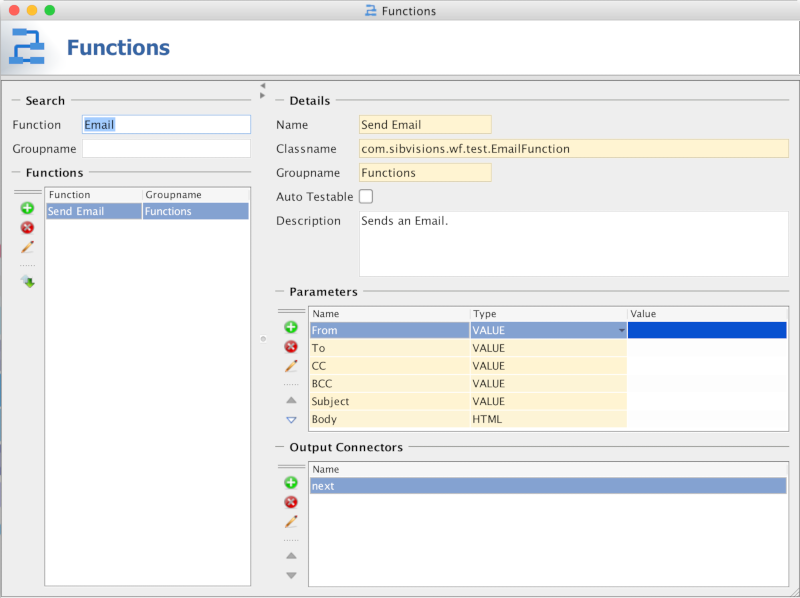Trace:
This is an old revision of the document!
A function is the code block behind a task. It's very simple to create a new function because a function is defined as simple Java interface:
- IFunction.java
public interface IFunction { /** * Gets the current workflow step. * * @return the current workflow step. */ public IWorkflowStep getWorkflowStep(); /** * Initializes the function. * * @param pStep the current workflow step */ public void init(IWorkflowStep pStep); /** * Runs the function. * If the function returns <code>true</code>, the function is fully done, and the workflow jumps to the next step. * In case there are more than one next step, the finish function of IWorkflowStep has to be called. * Otherwise, an exception will be thrown. * If finish is already called, it does not matter whether <code>true</code> or <code>false</code> is returned. * * @return <code>true</code>, if the function is done. * @throws Throwable if function fails. */ public boolean run() throws Throwable; /** * Notifies that the workflow is cancelled. * * @throws Throwable if canceling fails. */ public void cancel() throws Throwable; }
The interface already has an abstract implementation, so it's really simple to create a new function. Our example will send an email, so it's the EmailFunction:
- EmailFunction.java
public class EmailFunction extends AbstractFunction { @Override public boolean run() throws Throwable { XmlNode smtp = getApplicationZone().getConfig().getNode("/application/mail/smtp"); if (smtp == null) { throw new IllegalArgumentException("SMTP config not found (path /application/mail/smtp)!"); } String host = smtp.getNodeValue("host"); String port = smtp.getNodeValue("port"); String username = smtp.getNodeValue("username"); String password = smtp.getNodeValue("password"); boolean tlsEnabled = Boolean.parseBoolean(smtp.getNodeValue("tlsenabled")); String defaultsender = smtp.getNodeValue("defaultsender"); String from = getNotNullEvaluatedParameter("From"); String to = getNotNullEvaluatedParameter("To"); String cC = getEvaluatedParameter("CC"); String bCC = getEvaluatedParameter("BCC"); String subject = getNotNullEvaluatedParameter("Subject"); String body = getEvaluatedParameter("Body"); log("Mailserver: " + host + ":" + port + "/" + username); Mail mail = new Mail(host, port, username, password); mail.setTLSEnabled(tlsEnabled); mail.send(CommonUtil.nvl(from, defaultsender), to, cC, bCC, subject, body, null, null); log("From: " + CommonUtil.nvl(from, defaultsender)); log("To: " + to); log("Subject: " + subject); return true; } }
The implementation is straightforward. It extends the AbstractFunction and implements run method. The email settings will be read from the application configuration, and the email settings will be read from the input parameters. Here's an example:
<application> ... <mail> <smtp> <host>smtp.yourserver.com</host> <port>587</port> <username>username</username> <password>password</password> <tlsenabled>true</tlsenabled> <defaultsender>Noreply <noreply@yourserver.com></defaultsender> </smtp> </mail> </application>
Finally, the email will be sent.
But there's still one open question: how do we define the input parameters?
Simply use the functions screen and enter all required information:

That's it! Start using your new function.

